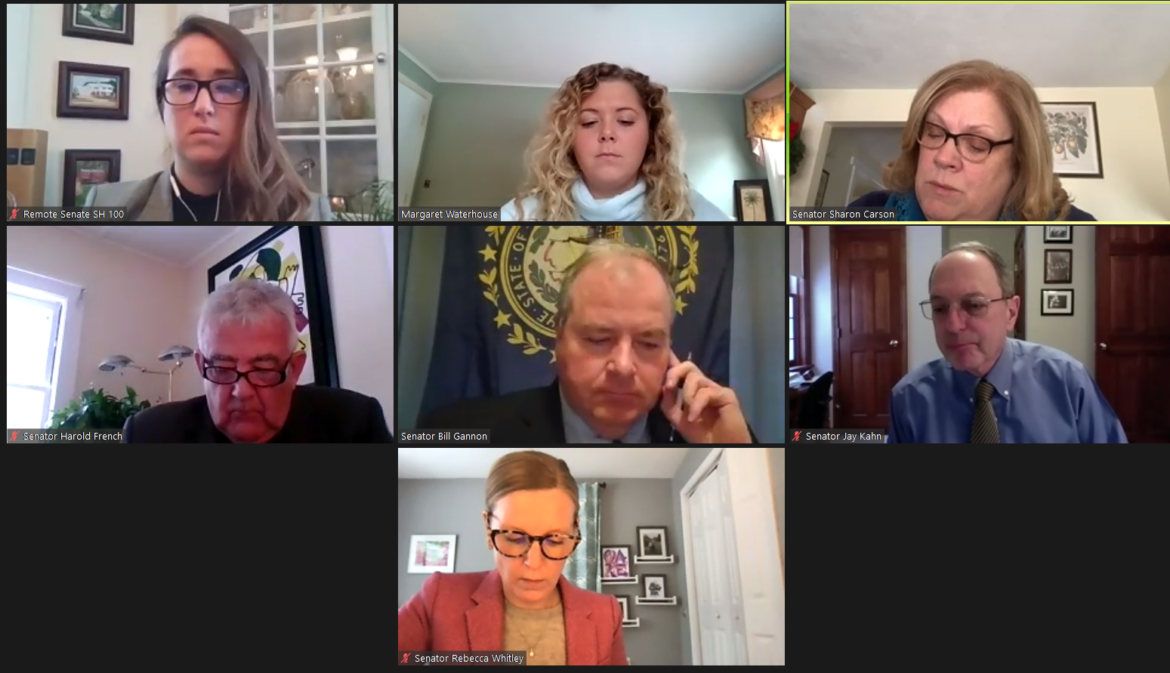By PAULA TRACY, InDepthNH.org
CONCORD – Judges could receive annual implicit bias training and a state pool of funds could be developed for local police body and dashboard cameras under a bill now being considered at the State House.
These and a number of other recommendations for change from the 2020 governor’s Commission on Law Enforcement Accountability, Community and Transparency – were heard by the Senate Judiciary Committee on Tuesday.
Senate Bill 96-FN-A would also require or establish:
– information on driver’s licenses relative to race and ethnicity
– a change in juvenile delinquency definition
– details related to school resource officers
There is a lot of bipartisan support for the bill.
Responding to a national crisis, a sort of racial reckoning following the videotaped death in May of a black man, George Floyd, at the hands of a white police officer in Minnesota, Gov. Chris Sununu established the LEACT commission. A copy of the commissions 48 recommendations is here https://www.governor.nh.gov/sites/g/files/ehbemt336/files/2020-09/accountability-final-report.pdf.
Sununu urged the task force to work expeditiously to find things that they could agree on to make the state more racially equitable and transparent to the public.
The commission agreed to a broad set of recommendations which include improved bias training, funding for police to have cameras, and other provisions.
The lead sponsor is state Sen. Jeb Bradley, R-Wolfeboro, but it has bipartisan co-sponsors including members of the Senate Judiciary Committee. These include Senators Becky Whitley, D-Concord, and Jay Kahn, D-Keene.
Bradley said there is wide support for the bill and there are a few technical amendments, one of which will be offered by the Attorney General.
“I would be pleased to work with the committee to fine-tune it in any way possible,” Bradley said.
ACLU-NH’s Joseph Lascaze, who served on the LEACT commission, said he was in full support of the legislation. It will strengthen the state’s reputation for transparency and enhance comprehensive data collection.
Londonderry Police Lt. Mark Morrison, of the New Hampshire Police Association, who also served on LEACT, said the bill represents some of the recommendations of the commission and it is supported by the association. He suggested the use of the term “race” rather than also including “ethnicity” for clarity in the inclusion of the box on a license or ID.
But Whitley said she wondered how the information on Latinos would be collected if ethnicity was not included.
“It’s a statistical challenge,” Morrison said. “We just want to make sure that we can comply.”
Whitley said, “I just don’t want to exclude anyone.”
Ken Norton, executive director of NAMI-NH and a member of the LEACT Commission said there is a lot of overlap between those with mental illness and law enforcement issues. He supported the bill and cautioned against any significant changes.
Hollis Police Chief Joseph Hoebeke, who served on the legislative workgroup for the LEACT Commission, said this bill includes some of the important recommendations. He supported the bill but offered minor amendments including “in-car cameras” rather than “dash” cameras. He said he supports cameras in this day and time saying they protect all.
Records management issues were also addressed by the chief.
He said the public has a right to information and in the future, needs a state database for percentages of arrests for people of color because the current system does not allow for that to be readily available and there would be a financial burden for communities.
Sen. Cindy Rosenwald, D-Nashua, said she was pleased to co-sponsor the bill and said the police reforms are important and necessary as identified by the LEACT board.
“It’s also very responsive to residents,” who stood with peaceful Black Lives Matter protests across the state, she said.
Senate Bill 96 would also create a fund to provide grants to local law enforcement agencies to assist with the purchase, maintenance, and replacement of body-worn and dashboard cameras and ongoing costs related to the maintenance and storage of data recorded by the cameras.
The fund would allow all local law enforcement agencies to be eligible to apply for grants from the fund and it would be overseen by the commissioner of the Department of Safety.
Moira O’Neill, the state’s child advocate, addressed the issue of child delinquency and noted that children at 13 years old may not have the brain development to understand the judicial process.
She supported the bill, overall.
Will Stewart of Stay Work Play NH also supported the bill saying the state needs more young people moving to New Hampshire and a lack of diversity is holding that back. Equity and inclusion have become a priority for the organization, he said.





